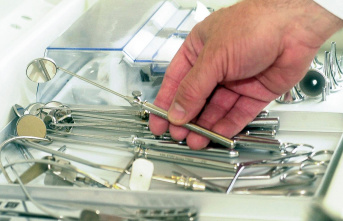“Planned Parenthood offers medical abortion services up to 10 weeks of pregnancy. With this method you can end your pregnancy in the privacy of your home.” "Plan C gives you up-to-date information on access to the abortion pill online in the US." “Is it safe to do a medical abortion myself with online medications? Aid Access supports women who are otherwise unable to access an abortion, and protects their human rights”...
These are some of the advertisements with which three of the many organizations and companies that provide abortion services offer advice, consultations and provision of abortion pills in person and, above all, by mail: a system that is already the majority in the United States and has skyrocketed with the passage of state abortion veto laws.
Now, the leak of the draft of the sentence by which the Supreme would overthrow the doctrine that protected that right since 1973 ( Roe vs. Wade ) intensifies the war already underway between states for and against abortion: conventional and practiced with pills. And it predicts a huge increase in the traffic of these drugs, whether legal, dubious or illicit. There is data.
When Texas passed its sweeping 6-week abortion ban in September, demand for abortion pills recorded by Aid Access increased more than twelvefold there, from 11 to 137 a day in the first week after the ban. Then the requests stabilized at about 30 a day.
As a solution for patients residing in one of the 26 US states where anti-abortion laws have been passed or written, Dr. Rebecca Gomperts of Aid Access offers abortion pills made in India through her abortion clinic. Australia. The price is 110 dollars, and the delivery time, from five to 15 days.
Plan C, meanwhile, lists half a dozen websites that ship the same drugs, most of which are also made in India, although China is also a prominent point of origin.
The day after the Supreme Court's draft ban was leaked, already voted by five of the six magistrates who form the conservative majority among the court's nine judges, the Plan C website went from its usual hundreds of daily visits to 56,000 on that single day.
In those days, Elisa Wells, co-founder of this association dedicated to guiding women who want to have an abortion but cannot due to some restriction, carried out one of the experiments that she usually does to test her "not illegal but creative" methods against the laws anti-abortion She took an empty prescription drug bottle, filled it with beans, put it in an envelope, and mailed it to a friend. No problem. The laws that 26 states have already launched in anticipation of the Supreme Court confirming its sentence "will not stop abortion but will change the way women access it," says Wells.
The United States Food and Drug Administration (FDA) authorized in 2000 the abortion medications: mifepristone and misoprostol. In 2020, under the impetus of the pandemic, abortion with these drugs became the method used in 54% of pregnancy withdrawals, very often after virtual consultation. Last December, the FDA eliminated the requirement to dispense both drugs in person, to reduce the burden on health care.
Nineteen states have banned so-called "medication teleabortion," which typically includes a consultation and prescription. In contrast, Connecticut and California plan to protect their doctors and citizens from penalties in those states for helping women from those places to abort, by whatever method.
There is a kind of civil war in this country over reproductive rights. And the battlefield is shifting from clinics to postal services.
4












